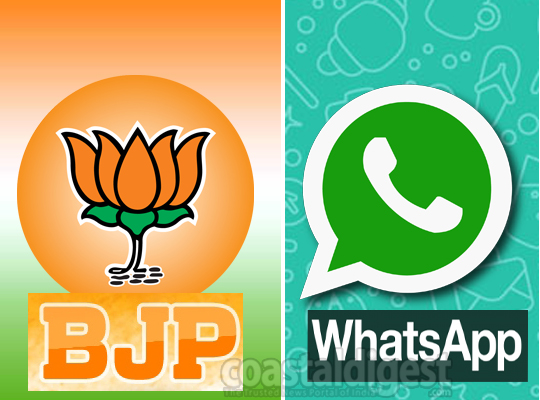Bengaluru, Jun 27: As a part of its election strategy, the state BJP is planning to create at least 5,000 WhatsApp groups in a bid to reach out to the electorate ahead of the next year’s Assembly polls.
The party has started identifying its workers who could be appointed as the administrators of the WhatsApp groups. “We are planning to create at least 25 WhatsApp groups in each of the 224 Assembly constituencies. These will not be general groups but will be segmented to cater to different sections of the electorate. For instance, there will be groups specific to information technology professionals, teachers, senior citizens, people who have migrated from other states and so on,” BJP IT Cell state convenor K Amresh said.
He said that the groups are being created to bond and reach out to the electorate rather than propagate the party ideology. “WhatsApp is turning out to be the best social media connect. Our internal survey has revealed that people tend to stay connected more to WhatsApp rather than Facebook and Twitter,” Amresh said.
The administrators will select members for the respective WhatsApp groups. The Assembly constituency-wise data base created during the party’s membership enrolment drive will be utilised for the selection process. “On the content and other aspects of our social media reachout initiative, training programmes for the administrators will be held at the regional levels soon,” Amresh added.
In a way, the state unit of the BJP is trying to emulate the Uttar Pradesh model in its social media mass outreach programme. Ahead of the Assembly elections in Uttar Pradesh earlier this year, the party had constituted a number of coordinated teams comprising information technology experts. Regional units and district committees were constituted. These teams had formed 10,300 WhatsApp groups.
BSY briefs Shah on political developments
BJP state president B S Yeddyurappa is learnt to have briefed party national president Amit Shah about the recent political developments in the state, including the likelihood of the ruling Congress going in for early Assembly polls.
Shah stayed overnight in Bengaluru on Monday en route to Puducherry. Shah arrived at the Kempegowda International Airport at 12.35 am on Monday and left for Puducherry at 8 am to participate in a party event. He stayed at a star hotel near the airport. Yeddyurappa, party general secretaries Aravind Limbavali and Arun Kumar received Shah at the airport. Yeddyurappa is said to have given Shah a brief update of his ‘Janasamparka Abhiyan’ and the recent decision of the state government to waive crop loans up to Rs 50,000. The interaction did not last long as it was already late when Shah landed in Bengaluru. Shah will visit the state for three days from August 3 and is planning to hold a series of meetings with the state leaders and the party cadre to chalk out the strategy for the Assembly elections.





Comments
OMG
Imagine the number of lies?
they could have made a new app, ohh sorry credit chor log hai, aadath se majboor
Add new comment